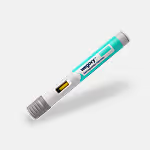Download the Felix App
Earn reward, visit our shop and get exclusive offers on the app
Download nowEarn reward, visit our shop and get exclusive offers on the app
Download nowPut your health first in 2026 with free visits on all categories, and $200 off longevity testing.
Download nowPut your health first in 2026 with free visits on all categories, and $200 off longevity testing.
Download now
AI-generated summaries may be inaccurate and do not constitute medical advice. Third-party AI tools are not under Felix's control, and your use of them is at your own risk.
If you are considering starting birth control pills, patches or rings, considering these benefits and consulting with a healthcare practitioner can help you find the ideal birth control for you and your body.
This article discusses the various advantages and benefits of hormonal birth control, the different types of pills, and potential disadvantages.
Keep reading to learn what you stand to gain from a birth control prescription.
Birth control pills are oral contraceptives containing the hormones estrogen and progesterone (or progestin, the synthetic form of progesterone).
Some birth control pills are progestin-only, meaning they do not contain estrogen.
Along with helping to prevent unplanned pregnancies, additional uses for birth control pills include:
Birth control pills enable three events to take place in the body:
Some birth control pills can also stop or pause the occurrence of a regular period.
There are many different types of birth control pills available in Canada. Most can be sorted into two categories — combination pills or progestin-only pills (also called the mini-pill).
The primary difference between these pills is that combination pills contain estrogen and progesterone, while the mini-pill only contains progestin.
Both hormonal birth control pills have an effectiveness of 91% with typical use and 99.7% with perfect use.
Here is a breakdown of the other differences between these pill types:
As mentioned, combination pills include both estrogen and progestin.
These pills can come in 21-pill or 28-pill packs. With the 28-pill pack, there are seven placebo pills present to be taken during the fourth week as a hormone-free break. Comparatively, 21-pill packs do not contain any placebo pills.
Depending on the brand and the advice of your healthcare practitioner, the seven-day hormone-free break can be followed or skipped with both 21-pill and 28-pill packs. If the break is taken, a woman’s regular period can occur.
For women who take the week-long hormone break, the 28-pill pack is often preferred, as it helps them to remember to take a pill every day. Alternatively, a 21-pill pack may be the better option for women who take the pills continuously.
In addition to having different pack quantities, combination pills can be further divided into two sub-types:
The mini-pill is a progestin-only type of birth control pill.
Like combination pills, the mini-pill comes in packs of 21 pills. However, there are no 28-day pill packs for the mini-pill, and a seven-day hormone-free break is not generally included with these prescriptions.
The mini-pill works the same as combination pills — a key difference between these pills is the lack of estrogen in the mini-pill.
Estrogen has some risks associated with it, such as the potential to raise a person’s blood pressure. As a result, estrogen-containing birth control is not suitable for all women.
The mini-pill is typically prescribed to women who:
Any woman who is interested in hormonal contraception can consider birth control pills.
As we have covered, not everyone is well-suited to take estrogen-containing birth control pills. However, progestin-only birth controls are a safe and viable alternative for women who cannot take estrogen.
Women over the age of 35 are thought to have a higher risk of developing heart-related problems.
This risk is heightened if one or more additional risk factors are present, such as a smoking habit or migraines with aura.
If you are 35 or older and on birth control pills — or considering starting birth control pills — a healthcare practitioner can help you decide which pill to take to meet your specific health needs and goals.
The key is to speak with a healthcare practitioner about your existing health conditions, lifestyle habits, and potential health risk factors you may possess. This includes discussing your family histories of diseases like heart disease and cancer.
Some of the key factors that you should discuss with a healthcare practitioner include the following:
Birth control pills have various advantages and benefits, making them a prevalent form of contraception in Canada.
The advantages of taking birth control pills include the following:
In addition to these advantages, Sex & U (an educational initiative of the Society of Obstetricians and
Gynecologists of Canada) reports that combination birth control pills also provide extra benefits that may include:
Depending on the type of birth control pills you take and the dosing schedule you follow, birth control pills can affect the occurrence of your regular period.
This happens with combination pills, which you can take in 3 different ways:
As with any medication, birth control pills have disadvantages and potential risks.
These may include:
If you are curious about the advantages of birth control pills, it is essential to know what types of questions to ask your healthcare practitioner.
Here are some frequently asked questions regarding birth control pills:
As covered earlier, the main changes in your body due to birth control pills happen in the ovaries and uterus, making it more difficult for an egg to be fertilized and implanted.
These changes are considered reversible, meaning that your body will return to its original state if or when you stop taking birth control pills.
Like any medication, birth control pills can have some starting side effects when beginning the prescription.
The side effects of birth control can include
If these side effects persist for longer than one to two months, or if they become severe, contact your healthcare practitioner immediately.
When appropriately taken and if compatible with your body and health, birth control pills should not pose any long-term side effects.
There are a few long-term risks, though the occurrence of these is rare. These risks include:
These are important risks to discuss with your healthcare practitioner, as they can help you determine what risk factors you possess and which type of birth control pill will put you at the most minimal risk possible.
Choosing the best birth control pill requires a thorough consultation with a healthcare practitioner. In your consultation, discuss your family history of health conditions, any pre-existing health conditions you know you have, and your lifestyle habits.
Additionally, you should ask your healthcare practitioner about the risk factors of birth control pills and discuss which risk factors you may have.
Get started with Felix today to discuss what birth control options may best suit you.
Medically reviewed by
References




























